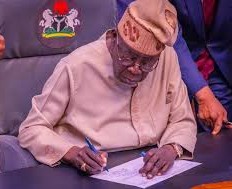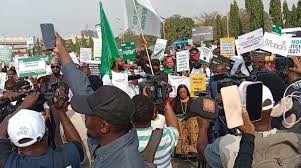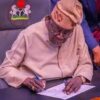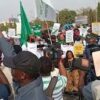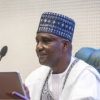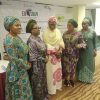The Joint Committee on Electoral Matters of the Senate and House of Representatives took a major step towards accelerating an amendment of the Electoral Act 2022, as they conducted a public hearing, which signals an intention to proceed with the passage of a new Electoral Act 2025. The House of Representatives has already passed the
The Joint Committee on Electoral Matters of the Senate and House of Representatives took a major step towards accelerating an amendment of the Electoral Act 2022, as they conducted a public hearing, which signals an intention to proceed with the passage of a new Electoral Act 2025.
The House of Representatives has already passed the draft bill for the first and second readings. The Senate has also expeditiously passed it for first and second reading. Both chambers have expressed their readiness to get the amendments passed as quickly as possible.
Speaker of the House of Representatives, Abbas Tajudeen, and President of the Senate, Senator Godswill Akpabio, said on Monday that reforming the country’s electoral legal system is necessary for holding credible, free, and fair elections that are accepted across all segments of Nigerian society.
Both spoke at a one-day public hearing on the repeal of the 2022 Electoral Act and the re-enactment of the 2025 Electoral Act. Speaker Abbas said the nation’s democracy rests upon the credibility of the elections, stressing that unless the electoral processes are freer, fairer, cheaper, and less contentious, “we endanger the fourth republic.”
Senate President, Godswill Akpabio, said electoral reform is not just a technical exercise, but the lifeblood of democracy and must ensure that leadership is born of legitimacy and that power flows from the people, not from privilege.
Represented by the Leader of the House, Prof. Julius Ihonvbere, the Speaker said, “These reforms respond to the national demand that the ballot box be sacred, that all votes count, and that disputes are resolved swiftly and fairly.”
Speaker Abbas said, “The Electoral Act Amendment Bill seeks not only to strengthen measures against electoral fraud, improve access for persons with disabilities, and establish clearer timelines for resolving disputes, but also to reduce the ambiguities that trailed previous elections.
“Our goal is to make elections less contentious and litigious, lower their cost through single-day voting, and make the process of party primaries more democratic and inclusive.
“Other proposals include electronic transmission of results, and the establishment of an Electoral Offences Commission to professionally investigate and prosecute electoral crimes, as well as firmer deadlines for the resolution of election disputes so that governance is not held hostage by endless litigation.
To further fine-tune the Bill, the two Committees on Electoral Matters will hold a Joint Retreat on the new Electoral Bill between 16th and 19th October in Akwa Ibom State.
The new Electoral Act will be an improvement on the current Electoral Act when passed. Several provisions in the existing Act will be strengthened, including provisions requiring the electronic transfer of election results. Some of the highlights of the changes include:
- Guaranteed early release of INEC funds.
- Expanded voter registration and inclusion of prison inmates.
- Tighter timelines for nominations and candidate substitutions
- Strengthened campaign finance and donor disclosure.
- Harsher penalties for electoral offences.
Monday’s public hearing was attended by lawmakers across the two chambers, representatives of international bodies, government officials, civil society organisations, academics, and members of the public who actively participated and contributed to the discussions.
The Development Director for the British High Commission in Nigeria, Mrs. Cynthia Rowe, in her open remark, commended the National Assembly for responding to citizens’ calls for a better electoral system.
She said, “Today is a testament of Nigeria’s commitment to its democratic process and institutions. It is a reflection of the progress made by the National Assembly to respond to the voices of Nigerian citizens and civil society who have called for a more transparent, inclusive, and credible electoral framework. As your partner, the United Kingdom is encouraged by the commitment of the National Assembly to implement the reforms highlighted by the lessons of the previous polls.”
Also speaking, the Speaker of the House of Representatives, Hon. Tajudeen Abbas, explained the purpose of the reforms and urged public participation to ensure transparency and credibility in Nigeria’s democratic system.
“The goal is to produce a new electoral act that stands the test of time. Nigerians know what they need for credible and transparent elections, but they are not available. Although the nation has made progress in its democratic system, there is a need for continuity by ensuring every citizen’s vote counts.”
“We need to take the right decisions to strengthen the country’s democratic system and ensure we hand over our children to a country that is working.”
Representing the Senate President, the Senate Chief Whip, Senator Mohammed Tahir Monguno, said the public hearing was to ensure collective participation and that the outcome aligns with international best practices.
“The National Assembly will always listen to the people, that is the reason for the public hearing. The purpose of the reform is to renew the soul of our democracy. The electoral reform is not just a reform of exercise; its outcome should reflect accountability and credibility of the electoral system.”
However, the members of the house gave room for deliberations to review the reform areas and the recommendations. A-16 priority reforms were submitted for review towards addressing issues facing Nigeria’s electoral process.
Members of the public, including civil society organisations, submitted recommendations to promote credible, transparent, and inclusive elections that strengthen Nigeria’s democracy.
For instance, Mr. Samson Itodo, Executive Director of Yiaga Africa, represented by Dr. Akin Akingbulu, called for improved voter registration processes, legal sanctions for defaulting political parties, and early special voting for journalists, military personnel, and INEC officials. He spoke on behalf of partners under the EU SDGN project 2.
Similarly, Mr Lanre Arogundade, Executive Director of the International Press Centre, presented a memorandum titled “Safeguarding Electoral Integrity for Democratic Consolidation” highlighting 16 key reform priorities.
His recommendations included early diaspora voting, electronic transmission of results from polling units to IReV, limits on campaign deadline violations, establishment of an election offences tribunal, and the creation of a political parties registration framework.
Other recommendations from the CSOs included prosecution of political offenders, stricter regulation of political parties, amending the BVAS Act to allow the use of PVCs and other identification methods for voting, compulsory electoral reports, pre-election testing of electoral technology, protection for journalists, clear distinction between free and paid media access, and joint civic and voter education initiatives by INEC and the National Orientation Agency (NOA).
Meanwhile, Mrs Lois Awta, Chief Executive Officer of the Cedar Seed Foundation, who represented women with disabilities, emphasised the need for inclusive governance and participation of Persons with Disabilities (PWDs) in the electoral process.
She said, “We implore the lawmakers to look into the challenges faced by the PWDs. Those affected by hand diseases could not vote electronically. We want inclusion, not exclusion, in the elections.”
“Also, I would like to point out that INEC wrongly addresses us. We are not physically challenged; instead, we should be addressed as Persons with Disabilities.”
Hon. Simon Bako Lalong, Chairman of the Senate Committee on Electoral Matters, assured participants that all recommendations raised during the hearing were timely and would be duly considered by the National Assembly.


